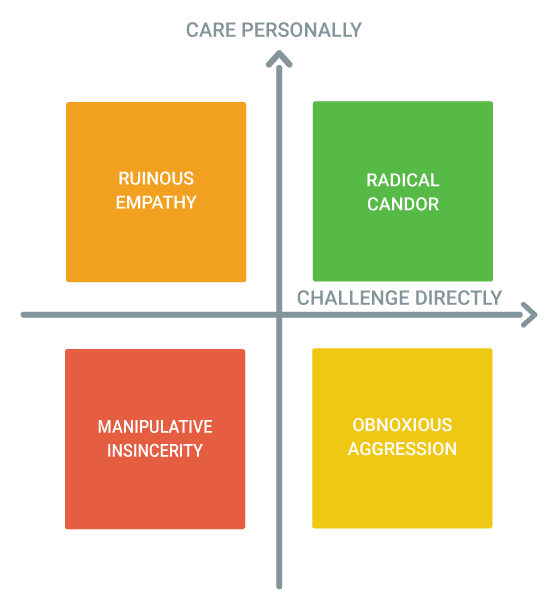Video: How Does Gender Impact Radical Candor?
We often encourage people towards Radical Candor with the phrase "Just say it!" It sounds so easy, so why don't more people already do it?
5 min read
Kim Scott Mar 10, 2020 3:11:16 PM

I had such an interesting talk with the folks at First Round Capital about gender bias and Radical Candor. Read the full article, or check out these highlights:
I was recently talking to a physics professor whose student didn’t know the quadratic equation. (I don’t remember it from high school algebra either, but I’m not majoring in physics.) Stunned, and wondering how she’d gotten this far with such a gaping hole in her knowledge, he told her she needed to learn it, immediately. Furious at the criticism, she slammed him in his rating as a teacher.
This didn’t start out as a gender issue. The initial problem was that this young person, like so many others, was unused to criticism – a phenomenon explored really well in an article from The Atlantic, The Coddling of the American Mind.
But other colleagues, many of them well-meaning men trying to be sensitive to gender issues, somehow turned the rift into a gender issue. Telling a student majoring in physics that she needed to learn the quadratic equation became a risky thing for the professor to do.
This situation was bad for the student who didn’t learn what she needed to know to succeed. And it was bad for all the female students this professor taught after her.
Understandably, he became more hesitant to criticize the work of his female students than his male students. But to grow in their field, these young women, like their male counterparts, needed his criticism. The situation wasn’t much fun for the professor either. Real teaching – the reason why he’d chosen his profession – became risky.
This scenario illustrates two trends that when taken together are creating a perfect storm in higher education – and blowing through all companies where millennials are working today. One is a trend not to criticize, or even to expose, people to facts that might be perceived as “disturbing” from history or literature or any other field.
Combine that with gender politics, and learning takes a real body blow. Will the tone of the current "campus conversation" (or lack thereof) backfire and reduce mentorship and learning for women? I’m focusing on gender in this article, but there are important parallels in race – and anytime relationships cross group boundaries.
The strange case of the quadratic equation is extreme, but milder examples happen every day – not just with college students, but with middle-aged people working at companies that pride themselves on being data-driven.
Recently I was talking to a close male friend who’s an engineering leader about women in tech. I suggested he ask a woman who works for him – a person whose career he has supported and nurtured for years – what she thought. He looked up at me with real surprise. “I can’t talk to her about that! It’s too fraught,” he said.
This from a man who is not just unbiased but truly sensitive to bias and determined to stamp it out. He catches things even I miss. So if he can’t have a Radically Candid conversation about gender issues with a woman who works for him we’ve hit a real low.
The problem is not him, nor the woman who works for him. I know them both, and I am pretty sure that the conversation would’ve gone well. But the swirl around this issue has everybody walking on eggshells.
In a recent article in The Wall Street Journal, Elisabeth Kelan, a professor of leadership and organization at Essex Business School in the U.K., says: "There’s this fear that if you give a woman honest feedback she will break out in tears, that women need to be protected. That’s just not the case."
A 2016 study analyzed in the Harvard Business Review found that, "vague feedback is correlated with lower performance review ratings for women — but not for men. In other words, vague feedback can specifically hold women back."
This why it's important that Radically Candid feedback be specific and clear. The purpose of feedback is to let a person know what to do more of and what to do less of. If feedback is not specific, there is no way for the recipient to know how to improve their performance.
The HBR study found that women were almost 15% more likely than men to receive vague feedback, and that feedback given to men was more often linked to business outcomes whereas women most often received feedback about their communication styles.
We must stop these gender politics....
Of course, political correctness and a fear of tears are not the only problems. Gender bias is a fact of life, and it’s worth looking at how it pushes women away from Radical Candor, which hurts them, as well as the men they work with. If gender politics makes it difficult for men to be Radically Candid with women, gender bias makes it difficult for women to be Radically Candid with both men and women.
Kieran Snyder, a linguist and co-founder of Textio, applied linguistic analysis to performance reviews, and she found that when women Challenge men or women Directly – which they must do to be successful – they get penalized for being “abrasive.” To be sure, the abrasive label gets placed on women by other women as well as by men.
Snyder wrote an article about her findings for Fortune, which sparked some of the longest, most impassioned email threads I’ve seen at several companies that I advise. Another story on Snyder’s research was Fast Company’s number one leadership article of 2014. Why did this article strike such a nerve?
Every professional woman I know has many, many stories of being called some version of “abrasive,” or of being disliked for being too aggressive – and of paying the price professionally.
Let’s examine an abstract case, and show why the “abrasive” label holds women back and contributes to fewer female leaders, even in organizations that start out with a 50-50 gender balance. Take Snyder’s example of two colleagues who perform at the same high level:
These comments will translate into performance ratings, and the ratings will affect promotions. Let’s assume that Jessica gets a slightly lower rating than Steve as a result of her so-called “abrasiveness.” Not such a big deal in a given quarter, perhaps. But a series of lower ratings will eventually cost Jessica a promotion. And even if the ratings aren’t lower, selection for promotion and leadership roles depend on “likeability.”
When this kind of bias plays out over a whole organization, the impact on female leadership is profound. Researchers ran a simulation of what happens to promotions over the course of several years when bias impacts ratings just a little bit. When gender bias accounts for just 5% of the difference in performance ratings, an organization that starts out with 58% of the entry level positions filled by women winds up with only 29% of the leadership positions filled by women.
Of course, that’s only part of the story. Let’s look at what happens to Jessica personally over the course of her career, not just the leadership composition of her company. If she’s early in her career, she’ll probably get promoted eventually despite her alleged “abrasiveness,” but now she’s a year or so “behind” Steve.
Fast forward another five-to-seven years. Now Steve is two levels ahead of Jessica. Since pay increases steeply with each promotion, he may be getting paid a lot more than Jessica is paid. If Steve and Jessica are married, and they have a child, guess whose career is more important for family income, and who’s more likely to stay home from work when the baby is sick?
But that’s not even the worst-case scenario for Jessica. Let’s imagine that Jessica takes the “abrasive” feedback to heart and quits Challenging Directly. She adjusts her behavior so that she is less effective at work. Instead of being “Radically Candid,” her feedback is always “Ruinously Empathetic” or “Manipulatively Insincere.”
This makes her less effective as a leader. So now, in addition to gender bias, there are real performance issues to contend with. In this case, Jessica is never going to get ahead. Frustrated beyond measure and feeling that she must choose between being liked and being successful, she decides that this is not a game worth playing – and quits.
Some version of this has happened to literally every professional woman I know. We must stop this madness, too.
This article was updated on March 11, 2020.

We often encourage people towards Radical Candor with the phrase "Just say it!" It sounds so easy, so why don't more people already do it?

We have a great story to share with you about a company that rolled out Radical Candor in their organization. Gem, a Los Angeles-based blockchain...

We recently got the chance to talk with another leader who has rolled out Radical Candor on his team, and we wanted to share his experiences with...